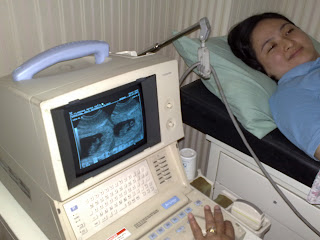I like to share this article; which I read in the International Herald Tribune; to those who, like me  , like to blog about places they've been to or food that they've tried, and to those who really write about food and restaurants.
, like to blog about places they've been to or food that they've tried, and to those who really write about food and restaurants.
http://www.iht.com/articles/2009/01/14/style/14simon.php
In Paris, a critic criticized
By Elaine Sciolino
Wednesday, January 14, 2009
PARIS: When the sommelier in the overpriced Paris restaurant started to refill the glass without asking, François Simon stopped his hand in midair before a drop could fall.
"I like to control the temperature of my wine," he announced. "In a restaurant, I am horrified by having to obey. I want to be indulged."
Simon may be the most feared and most read figure in France's culinary world, an ordinary looking man with a fountain pen as razor-sharp as a butcher's slaughter knife.
As food critic for the right-of-center Le Figaro newspaper for more than two decades, he has skinned, sliced, grilled and roasted his subjects, indifferent to the impact of his words on them, but can be thin-skinned when they hit back.
He once described a meal at the restaurant Guy Savoy, a Michelin favorite, as "a three-star crucifixion," faulting Savoy for serving his signature artichoke and truffle soup out of season. Marc Veyrat, who enjoys an unheard-of perfect 20-20 score in the Gault-Millau guide, is for him a "clown" and "a fake peasant" with megalomaniacal tendencies.
He has extended his reach with books, a weekly cable television show in which he hides his face and a blog that includes his secret video recordings with a hand-held camera of some of the great and not-so-great tables of France.
Not content simply to pass judgment on others, Simon claims to be an accomplished cook himself. His blog, in both French and English, boasts that he can cook a chicken 200 ways.
Last month, though, he took a step that few of his colleagues would have dared. He closeted himself in the kitchen of the tiny, mural-tiled bistro Le Cochon à l'Oreille and cooked five nights in a row, each night for 20 or so diners who had won the free meals in a first-come-first-served Internet sign-up.
Simon's debut as a chef occurred during the annual "Le Fooding" week, sponsored by a French gastronomic movement that he strongly supports and that promotes an egalitarian, irreverent approach to dining. He announced his kitchen stint on his blog and in his column, and by the time he was ready to cook, much of the French media world had taken note.
The meal was barely adequate, according to five diners one night. The pumpkin soup, seasoned heavily with ginger, vanilla and black sesame oil, was grainy, undercooked and so dense it stood up in stiff peaks.
"I'm disappointed," said Julie Demarest, an administrator in a water purification company. "It's thick — like oatmeal. I don't like it."
The spiced chicken with pine nuts and golden raisins filled the dinner plate, but was accompanied only by an underdressed green salad. The zabaglione with sake was frothy and thin rather than creamy; the centers of the macaroons were chewy rather than soft. When the maître d'hôtel offered seconds on the dessert, there were few takers.
"Those macaroons — they're so hard they could choke a Christian," said Marc Beekenkamp, a Web designer, using an expression that means the dish is hard to digest.
But his colleague and friend, Matthieu Zerafa, came to Simon's defense. "Every day he sits in judgment, and now it's his turn to be judged," he said. "You have to compliment him on one thing — he has a lot of nerve."
That point, at least, has never been in dispute. Simon prides himself on being an outsider and a provocateur. His columns describe not only a restaurant's food, but also its service, décor and clientele, even down to the movement of the breasts of women around him.
Simon has created such a buzz around himself that some French reporters called him the model for Anton Ego, the dour, unforgiving food critic in the 2007 animated film "Ratatouille."
Brad Bird, the film's director, said through a spokesman that the character was a pastiche derived from many sources. No matter: Simon was quick to assume Anton Ego's persona.
"Since 'Ratatouille,' it hasn't stopped: I've become the darling of my nephews," he wrote in his blog, "Simon Says." He said that he loved it when his friends started calling him Anton Ego, writing: "This low-life Anton is a good guy. He sacrifices his reputation to celebrate the cuisine of a rat."
Simon has little use for the Michelin and Gault-Millau grading systems that have created a rigid gastronomic hierarchy and transformed chefs into superstars.
He has charged that politics often drives Michelin to sprinkle stars on less-than-worthy chefs. He relentlessly attacks certain multistarred French chefs and regularly proclaims that France has lost its "culinary supremacy."
Even before the British celebrity chef Gordon Ramsay opened his restaurant in Versailles last spring, Simon panned it. "Dishes like his starter of cream of Jerusalem artichokes with lardons of bacon and cabbage can be found in 70 Parisian restaurants which are just as good," he told The Daily Telegraph. "What's more, he is British, and Parisians don't like going to Versailles — it's much too far."
Simon accuses Alain Ducasse (with whom he once wrote a book on Provence) of empire-building commercialism, stratospheric prices, "photocopied cuisine" and worst of all, absenteeism from his many restaurant kitchens. He said Le Jules Verne, the Ducasse restaurant at the top of the Eiffel Tower, serves food "worthy of an airplane, first class — no, rather, business class."
He has nothing good and everything bad to say about many of Paris's gastronomic icons, including La Tour d'Argent, Hélène Darroze, Le Procope, Allard, Maxim's and Brasserie Balzar.
"My real problem is that chefs are used to extremely excessive literary praise," Simon said in an interview over a lunch in a restaurant where the appetizers averaged more than $40 apiece. "They become insufferable, divas. They can't take the least criticism. But when you talk of them like they're Beethovens or Mozarts, you're lying."
As for sommeliers, he wrote, "Perhaps we should drown them, to allow us to drink as we please."
For Nicolas de Rabaudy, a food writer who has reviewed Simon's books, Simon has become both mean-spirited and self-absorbed.
"His ego has surpassed him, the poor François," de Rabaudy said. "I mean, come on, François Simon is the only person who doesn't like Guy Savoy's artichoke and truffle soup. It's one of the great dishes of modern French cuisine."
Asked about Simon and his sharp pen, Savoy said: "Frankly, what he writes or says doesn't interest me one bit. Life's too short."
The most savage criticism of Simon came after the suicide of the Michelin three-star chef Bernard Loiseau in 2003.
Early that year, before Michelin announced its annual star ratings, Simon had written in two columns that Loiseau was to have lost one of his three stars, but had managed to hold onto it. Days after one column appeared, Loiseau killed himself.
The chef Jacques Pourcel, head of the Chambre Syndicale de la Haute Cuisine Française at the time, openly accused Simon of contributing to Loiseau's death.
Simon defended himself, saying in the interview that it was convenient for the chefs of France and Michelin to identify "a naughty boy who did villainous things." He added, "This misunderstanding will last forever."
Loiseau suffered from serious depression. Asked whether Simon's reviews played a role in her husband's death, his widow, Dominique, who runs the restaurant, said, "It's giving him too much importance."
Simon also showers criticism on other French food critics, faulting them for identifying themselves in restaurants, cozying up to chefs and taking free meals and gifts. "It is much easier to turn into a courtesan, to be inside rather than outside the house of the chefs," he said.
But other critics call his aloof approach sterile. "I want to get to know the chef, to understand what he feels, his frame of reference, his roots," said Jean-Claude Ribaut, the longtime food critic at Le Monde. ( Ribaut pays for his restaurant meals.) "I want to know if he grew up on a farm, if his father grew vegetables. If you go anonymously, you can't ever have this kind of dialogue."
Even though Simon books reservations under an alias and pays for his meals with alias credit cards, his face is known to many chefs, and his sideburns, flyaway hair and sartorial daring — bold tweeds, loud ties, velvet vests — sometimes give him away.
Simon portrays himself as close to his readers, soliciting their comments by printing his direct phone number at the bottom of his columns. He shamelessly boosts his favorites, including Yannick Alléno of Le Meurice, Pascal Barbot of L'Astrance and his favorite bistro, Paul Bert, in the 11th Arrondissement. Ravioli with tomato sauce prepared by the Italian chef Fulvio Pierangelini at Gambero Rosso in San Vincenzo "almost makes me cry with emotion," he said. He called a truffle à la croque au sel with a glass of Montée de Tonnerre chablis at Lucien Vanel in Toulouse, now defunct, "better than cocaine."
Even his admirers want him to tone down. "He's got a strong character, his articles are fun and he doesn't pontificate," said Christian Millau, co-author of the Gault-Millau guide, who gave Simon his first job as a critic 30 years ago. But, he added, "Sometimes I tell him not to overdo it."



